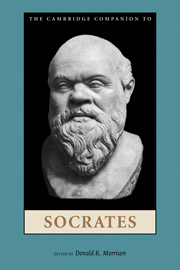Book contents
- Frontmatter
- 1 The Rise and Fall of the Socratic Problem
- 2 The Students of Socrates
- 3 Xenophon and the Enviable Life of Socrates
- 4 Socrates in Aristophanes’ Clouds
- 5 Socrates and the New Learning
- 6 Socratic Religion
- 7 Socrates and Democratic Athens
- 8 Socratic Method
- 9 Self-Examination
- 10 Socratic Ignorance
- 11 Reconsidering Socratic Irony
- 12 Socratic Ethics and the Socratic Psychology of Action
- 13 Socrates and Eudaimonia
- 14 Socrates’ Political Philosophy
- 15 Socrates in Later Greek Philosophy
- Socrates Bibliography
- Index of Names and Subjects
- Index of Passages
1 - The Rise and Fall of the Socratic Problem
Published online by Cambridge University Press: 28 March 2011
- Frontmatter
- 1 The Rise and Fall of the Socratic Problem
- 2 The Students of Socrates
- 3 Xenophon and the Enviable Life of Socrates
- 4 Socrates in Aristophanes’ Clouds
- 5 Socrates and the New Learning
- 6 Socratic Religion
- 7 Socrates and Democratic Athens
- 8 Socratic Method
- 9 Self-Examination
- 10 Socratic Ignorance
- 11 Reconsidering Socratic Irony
- 12 Socratic Ethics and the Socratic Psychology of Action
- 13 Socrates and Eudaimonia
- 14 Socrates’ Political Philosophy
- 15 Socrates in Later Greek Philosophy
- Socrates Bibliography
- Index of Names and Subjects
- Index of Passages
Summary
The Socratic problem has quite a history, and is now perhaps only a part of history, since its desperately unsolvable nature does not seem to guarantee it much of a future. It would undoubtedly be presumptuous to claim that the Socratic problem is a closed issue simply because it is not amenable to a satisfactory solution, but it is certainly useful to identify the principal obstacles and pitfalls that render the discovery of a solution improbable, or even impossible.
Socrates, as we know, wrote nothing. His life and ideas are known to us through direct accounts – writings either by contemporaries ( Aristophanes) or disciples ( Plato and Xenophon) – and through indirect accounts, the most important of which is the one written by Aristotle, who was born fifteen years after Socrates’ death (399). Because these accounts vary greatly from one another, the question arises as to whether it is possible to reconstruct the life and – more importantly – the ideas of the historical Socrates on the basis of one, several, or all of these accounts. The “Socratic problem” refers to the historical and methodological problem that historians confront when they attempt to reconstruct the philosophical doctrines of the historical Socrates. Any future stance on the Socratic problem, if it is to be an informed and well-grounded one, presupposes a full understanding of the origins and consequences of the proposed solutions of the last two centuries.
- Type
- Chapter
- Information
- The Cambridge Companion to Socrates , pp. 1 - 23Publisher: Cambridge University PressPrint publication year: 2010
- 12
- Cited by

